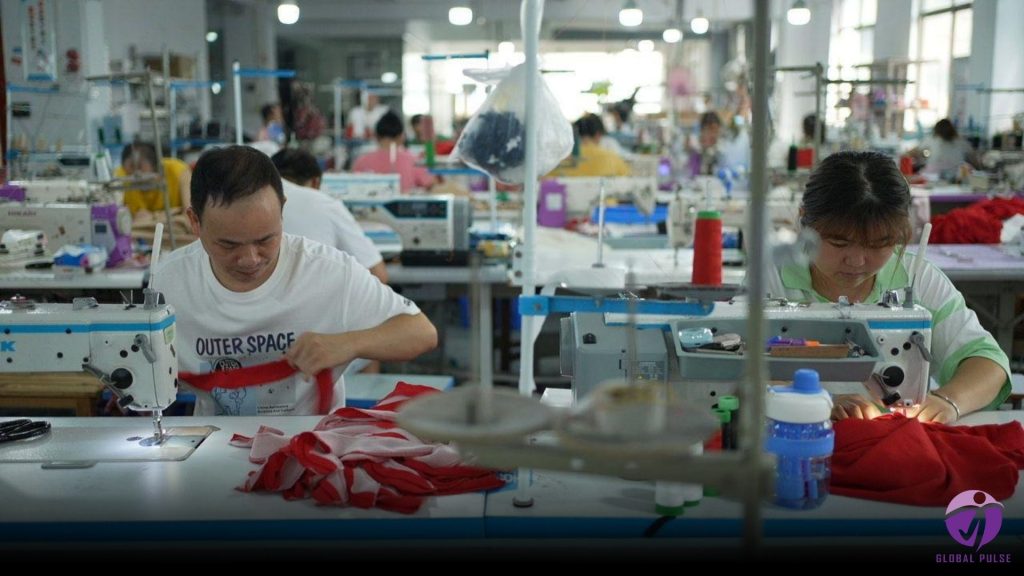China has urged global solidarity in response to President Trump’s tariffs. Its exporters struggle under new US levies that have surged to 104%.
An editorial in the state-run newspaper China Daily asserted that global unity has the potential to overcome trade tyranny, highlighting Beijing’s partnerships with Japan, South Korea, and various other Asian economies. A separate article urged the European Union to collaborate to “uphold free trade and multilateralism.”
On Wednesday, foreign ministry spokesperson Lin Jian addressed reporters, stating that Beijing “firmly opposes and will never accept such hegemonic and bullying practices.”
The tariffs arrive amid challenging circumstances for China’s faltering economy, where domestic consumption continues to lag, and exports remain a crucial engine of growth.
The extensive impact of Trump’s tariffs has prompted Chinese businesses to urgently reassess their supply chains. Many firms report that navigating this uncertainty has become increasingly challenging, and numerous countries feel the repercussions.
The owner of a Chinese business specializing in cross-border logistics for e-commerce, including air and sea freight, stated that the tariffs will diminish “already razor-thin profit margins.”
Increased tariffs drive expenses for goods forwarders, factories, companies, and sellers, resulting in lower earnings for all individuals.
Dan Wang from the Eurasia Group consultancy stated that any tariff exceeding 35% would eliminate all profits that Chinese businesses earn from exporting to the US or Southeast Asia.
“She noted that growth is expected to be significantly lower, as exports have accounted for 20% to 50% of growth since the onset of the Covid pandemic.”
While the Chinese government has not officially announced any retaliatory actions, reports indicate that Beijing is contemplating banning Hollywood films and suspending fentanyl cooperation with the United States. This information comes from Liu Hong, a senior editor at the state-run Xinhua news agency.
However, that would provide minimal reassurance to companies such as Fuling, a company specializing in disposable tableware for American fast food chains such as McDonald’s and Wendy’s, which has expressed concerns that the new tariffs will have a “significant impact” on its operations. It was reported that almost two-thirds of the company’s revenue in 2023 and in the first half of the previous year originated from the US market.
In response to the challenges posed by tariffs, Fuling, based in Zhejiang province, China, inaugurated a new factory in Indonesia towards the end of last year.
According to a company filing, Trump’s latest tariffs have created additional uncertainty, as Chinese exports from Indonesia now face a 32% levy.
Indonesia and numerous countries worldwide felt the impact of President Trump’s recent announcement regarding extensive tariffs, which he asserted would enable the US economy to thrive.
Economists have warned about the potential for a recession in the United States and the global economy. The tariffs have weakened global markets and attracted criticism from prominent billionaire CEOs, including Elon Musk, a known ally of Trump.
The import taxes implemented by Trump feature a 10% baseline tariff on nearly all imports entering the United States, alongside elevated custom tariffs aimed at what he designates as the “worst offenders.” Cambodia (49%), Vietnam (46%), and Thailand (36%) are among the developing economies that have seen significant advantages from robust export activities.
In response to Beijing’s announcement of reciprocal tariffs, Trump escalated the situation by increasing the levies on Chinese imports, doubling them to a staggering 104%.
Emo expressed optimism in an interview with the BBC regarding China’s potential to negotiate the reduction of certain taxes. He stated, “Only when a final decision is made can we plan our next steps.”
China has indicated a willingness to engage in discussions; however, former President Trump has not communicated with Chinese leader Xi Jinping since his return to the White House.
The American Chamber of Commerce in China cautioned its member companies on Wednesday that implementing such extensive tariffs is likely to result in more negative consequences than benefits.
The note signed by Chair Alvin Liu and President Michael Hart stated, “The current upheaval is without precedent, leaving uncertainty about how the existing measures will serve consumers in both countries or impact the wider economy. ”
Analysts suggest that the imposition of levies may compel China to undergo a significant economic restructuring, shifting its focus towards bolstering domestic consumption, an area where it has faced ongoing challenges.
According to Tim Waterer of Broking KCM Trade, the long-term sustainability of the tariffs for China remains in question.
A Chinese goods company manager stated, “The tariffs are designed to undermine China’s economic position. ”
Wu Changchun noted that numerous Southeast Asian nations facing significant tariffs, including Vietnam and Cambodia, are precisely the locations where many Chinese companies have shifted their operations.
A company based in Tianjin is set to negotiate with several of its American clients to distribute the financial impact of the tariffs. “While each case presents its unique circumstances, the overall impact has been significant,” he stated.
Mr Wu, whose company primarily manages shipping routes between China and Cambodia, reported a noticeable decline in freight volume.
According to reports, numerous construction projects in Cambodia have ceased operations following Trump’s announcement of tariffs.
Businesses could manage the financial impact of tariffs set at 10% or 20% by optimizing their supply chains, reducing profit margins, and distributing the costs among stakeholders. Trade may continue to take place… “However, at 104%, that situation is beyond the reach of trade-offs,” stated Mr. Wu, general manager at Maritima Maruba.
“This represents a complete decoupling.” Trade would effectively come to a halt.













